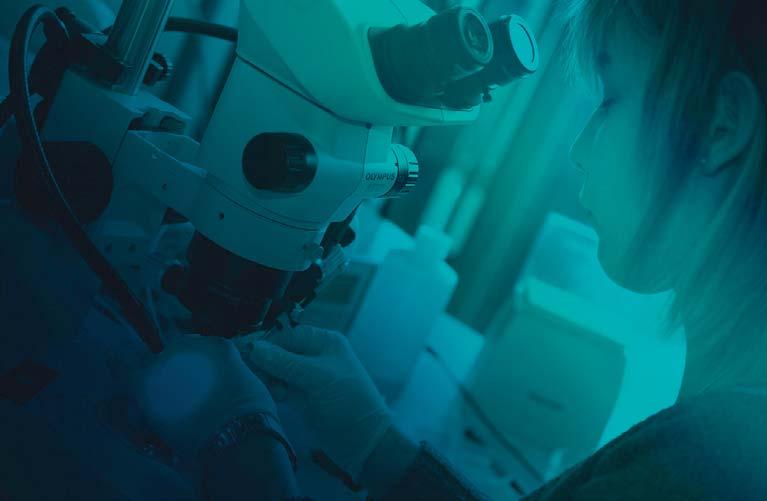© ULB
Bolstering the appeal of ULB research centres at a global level Interview with Prof. Oberdan LEO, Vice-Rector for research and promotion at the ULB, Institute of Medical Immunology, Immunobiology research unit I would also like to mention the research carried out within the inter-faculty Immunology Institute by the teams of Dr A. Marchant and Dr S. Goriely which aim to study the mode of action of the adjuvants present in vaccines, the various forms of immune memory and the action of regulatory T cells, and the Vascular Signalling Laboratory led by Prof. Benoit Vanhollebeke, whose work has been published in Science, on vascular biology using the zebrafish as a model. Lastly, I would like to remind the recent funding, by the federal government, of a state-of the art laboratory dedicated to the monitoring of immune responses in vaccinated individuals. This project illustrates the well-recognized expertise of ULB in the field of vaccine development and clinical immunology, important fields of research that the current pandemic has put at the forefront of the news.
W
© ULB-Isopix.be
hat are the key figures for research at the ULB? The ULB's research budget is €184M, €51M of which come from operating allowances and the rest from competitive financing (€54M from the FNRS and the remainder from public and private funding agencies, both Belgian and European). In addition, the ULB has nearly 3,400 lecturer/researchers of whom around 800 are members of the academic staff (700 from the ULB and 111 from the FNRS) and approximately 2,000 doctoral students. In 2019, 243 doctoral theses were presented. Currently we are able to identify 3,000 research projects in progress, i.e. 3 or 4 per member of the academic staff. The ULB also offers a dozen starting grants for researchers just entering their academic career. What are the strong points of health research at the ULB? I would like to begin with the works of Prof. Cédric Blanpain, who studies the stem cells responsible for the continuous generation of tumour cells in his laboratory on the Erasme campus. This year again, he has made an outstanding set of observations that have led to numerous publications in prestigious journals such as Nature or Cell. His work has led to the creation of a cancer cluster in partnership with Erasme hospital and the Bordet Institute. In addition, Prof. Blanpain created the spin-off ChromaCure with a view to developing inhibitors for a new target which is a key regulator in tumour initiation and development.
In your opinion, what are the main challenges that await researchers in your field of research, immunology? The recent pandemic has clearly demonstrated how our modern lifestyle (living in urban, densely populated areas and engaging in frequent long-distance traveling activities) has put us at risk for infectious diseases of pandemic nature. There is clearly an urgent need for developing new vaccine strategies, more efficient immune-monitoring techniques and a better understanding of the natural immune response to viruses. This last topic has been clearly overlooked in the past, despite previous examples of immune-mediated pathologies associated to viral infections (cf. the Spanish flu in the early 20th century). Efforts need to be dedicated to a better understanding of the mechanisms causing over-exuberant immune responses to viruses, the major cause of morbidity in SARS-CoV-2 infected individuals.
For his part, Prof. François Fuks stands out through his works on cancer epigenetics and more specifically the link between alterations in RNA and the appearance of breast cancer. He too has created a start-up, EPICS Therapeutics, with a view to giving his research clinical applications. Moreover, the ULB is pursuing other cancer immunotherapy research projects using animal models and clinical trials on breast cancer.
What still puzzles immunologists is the regulatory mechanisms that regulate such inflammatory responses. Whether immunosuppression (the capacity to dampen an immune response) appears as defective during inflammatory responses to viruses, or it acts in a predominant fashion in tumor bearing patients, thus opposing the spontaneous response to cancer cells. Notably, the recent successes in cancer immunotherapy can be explained through our better understanding of the mechanisms put in place by tumors to escape the control of the immune system and the development of treatments opposing this tumor-mediated immunosuppression. Despite the recent progress made in immunotherapy however, the majority of patients do not respond to these treatments, and today it is therefore important to continue our research efforts so as to learn to make better use of the immune system to control the various pathologies.
We should also point out the ULB Neuroscience Institute and its works on the development of the nervous system from stem cells (Prof. Pierre Vanderhaegen, KULeuven/ULB), drug addiction and the role of genes in potential resistance to this addiction (Prof. Alban de Kerchove d’Exaerde) and also the pioneering study on the role of a class of receptors in the detection of extracellular signals linked to inflammatory phenomena (Prof. Marc Parmentier). The ULB is also present in research on diabetes with the ULB Center for Diabetes Research, directed by Prof. Miriam Cnop, who is studying the cell death of ћ-pancreatic cells which produce insulin. 78

















































































































